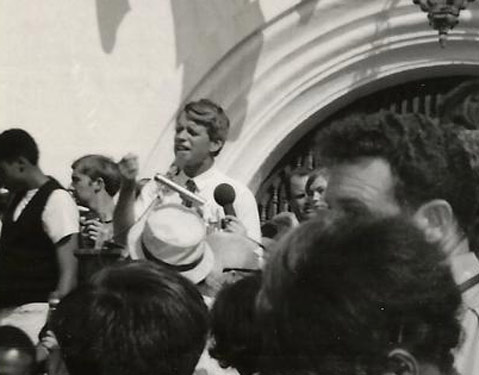When RFK Came to Town
Bobby at the Santa Barbara Courthouse

BOBBY AT THE COURTHOUSE: As I joined 4,000 people jamming the Courthouse Sunken Gardens to hear barnstorming Robert Kennedy, who among us could have dreamed that he’d be dead a few days later?
On that hot, sunny day, May 28, 1968, Kennedy, his eye on the presidency, was surrounded by Santa Barbarans reaching out, pawing and cheering, others jeering and sneering.
Only a month earlier, civil rights leader Martin Luther King Jr. had been shot to death, but there in the peaceful heart of Santa Barbara, Kennedy plunged into the crowd, showing no fear.

He was smiling, shaking hands, excited by his quest to pick up the fallen torch left by his brother, President John F. Kennedy, assassinated four years earlier in Dallas.
Bobby Kennedy, a charismatic ball of boundless energy and bursting with reformer zeal, had a behind-the-scenes brusqueness and my-way-or-the-highway attitude that rubbed many the wrong way. The Sunken Gardens was full of vocal backers of Senator Gene McCarthy, who’d launched a seemingly hopeless youth-based, antiwar primary campaign to unseat President Lyndon Johnson.
But after LBJ did poorly in the New Hampshire primary of March 1968, Kennedy jumped into the race (and LBJ jumped out), infuriating the McCarthyites. To them, Kennedy was a compromiser, a Bobby-come-lately who lacked the fire to end the Vietnam War.
To them, McCarthy was the noble warrior on a white horse. They didn’t trust Kennedy to end the war and bring the boys back home. Some of the signs that day read “Cop Out with Bobby,” “Sell Out with Bobby,” “Go Home, Bobby, Wherever That Is,” and “RFK Is Neville Chamberlain.”
McCarthy signs seemed to outnumber Kennedy’s. Around the country, students shaved their beards and cut their hair to be “Clean for Gene.” Protesters marched in Washington, yelling “Hey, hey, LBJ, how many kids have you killed today?” about his bombing campaign.
As Kennedy, wearing a white shirt and tie, spoke that day, I heard someone growl, “It’s like a Beatles concert. They didn’t come to listen; they came to scream.” McCarthy folks hooted when Kennedy tried to speak.
Those who couldn’t find a place to park left their cars in the street. One woman left her convertible in a red zone in front of the police station. Cops handed out at least 235 tickets and easily could have written double that.
I saw some little kids crawling through the crowd to get to Kennedy’s feet. I looked twice. They were my children.
“I looked on him as a god,” said my precocious, politically aware son Barclay, then 9. In retrospect, it’s hard to understand why Kennedy aroused such hatred. He stood for social justice and an end to racism. It was no barn burner of a speech. No “Out of Vietnam Now!” rhetoric. The strongest applause came when he spoke out against unilateral withdrawal of U. S. troops from Vietnam. South Vietnam, he said, must realize that “we can’t win the fight for them. They must do their part.”
A teenage blonde rushed up to her mother. “I shook his hand! I shook his hand!” Her mother seemed happy for her, although Mama was sporting a McCarthy button.
Kennedy, crushed by adoring fans as he left, jumped into a waiting convertible and was last seen heading down Anacapa Street. “He’s asking for it,” someone muttered. The Kennedys and FBI director J. Edgar Hoover shared no love. Hoover’s chief deputy, Clyde Tolson, was widely reported to have said, “I hope someone shoots and kills the son of a bitch.”
After winning the crucial California Democratic primary a few days later, Kennedy finished a speech at L.A.’s Ambassador Hotel, with the last memorable words: “And now, on to Chicago,” where the Democratic presidential convention was to be held.
Against the advice of his bodyguards, Kennedy took a shortcut out through the hotel kitchen. There, sinister destiny awaited in the form of a 24-year-old militant Palestinian. Sirhan Sirhan fired three bullets from a .22 caliber revolver into Kennedy, who died the next day.
If Kennedy could have been nominated instead of Sen. Hubert Humphrey, who commanded a huge number of delegates, it would have set up a grudge match pitting Kennedy forces against Richard Nixon, who’d been beaten by JFK in 1963. Humphrey, however, went on to face Richard Nixon in the 1968 election, and lost.



